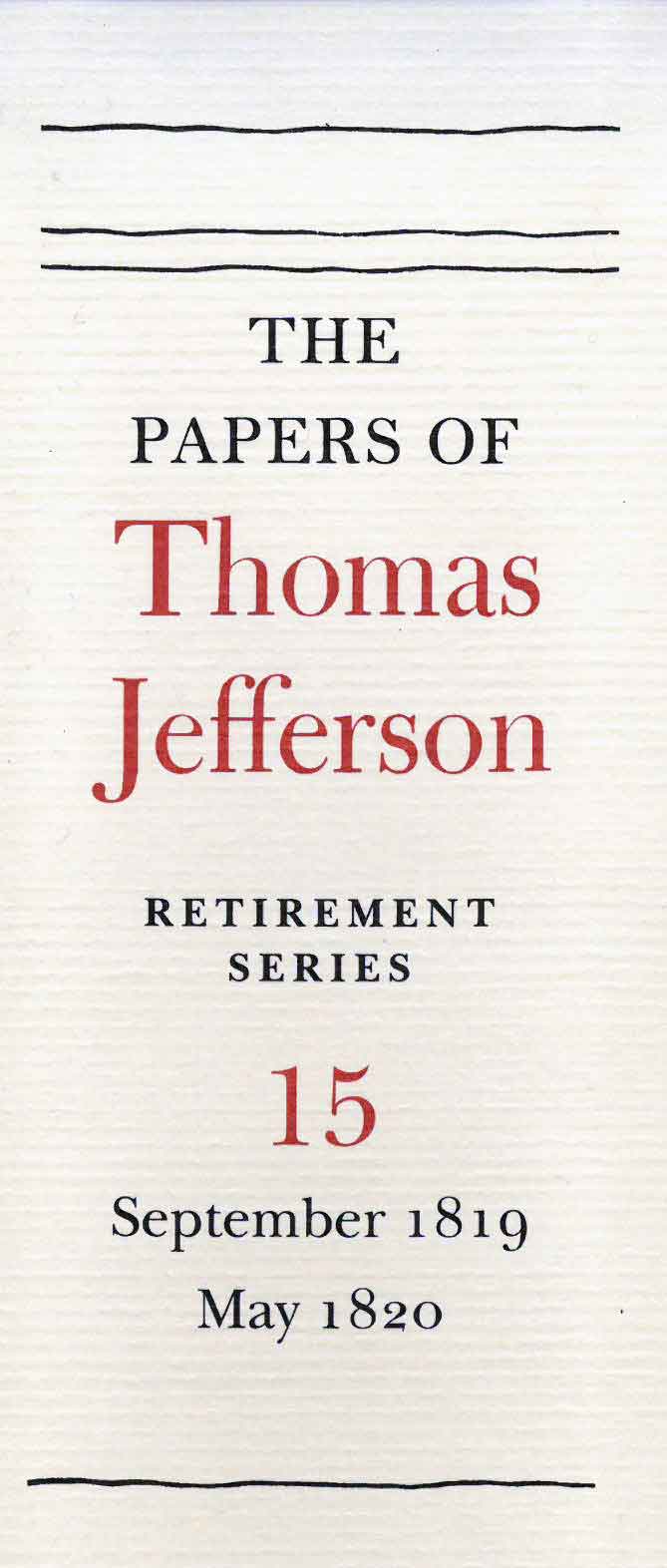 The 618 documents in this volume cover the period from 1 September 1819 to 31 May 1820. As the second decade of the nineteenth century came to a close, Jefferson, along with the rest of the nation, struggled to emerge from a widespread financial crisis and anxiously waited to see what impact Missouri’s impending statehood would have on the already-strained relations between the defenders and opponents of slavery.
The 618 documents in this volume cover the period from 1 September 1819 to 31 May 1820. As the second decade of the nineteenth century came to a close, Jefferson, along with the rest of the nation, struggled to emerge from a widespread financial crisis and anxiously waited to see what impact Missouri’s impending statehood would have on the already-strained relations between the defenders and opponents of slavery.
The fall of 1819 for Jefferson was dominated by health and financial concerns. Jefferson wrote to his friend James Madison that he had suffered from a “colic.” Word of Jefferson’s debility soon spread, and newspapers reported that his condition was grave. With rest and medication, he improved and thought he owed it to Madison’s friendship “to free it from the uncertainty of floating rumors” by informing him of his recovery. Jefferson spent a great deal of time preparing for the possibility, soon to become a reality, that his endorsement of $20,000 in notes for Wilson Cary Nicholas might leave him owing that sum to the Second Bank of the United States. Seeking to keep most of his own property out of danger, Jefferson placed 956 acres of his Bedford lands in a trust for payment if Nicholas defaulted. A local drought caused poor crop yields and rivers too low to transport what little could be harvested, making economic rebound difficult for the region. Jefferson’s mills and canal on the Rivanna River continued to be important to his business life. After more than two years in legal limbo, his lawsuit against the Rivanna Company was settled in December 1819. From Jefferson’s perspective, Judge John Brown’s decision was a victory because it ruled that the company could not require Jefferson to make improvements to his canal. To determine the extent of the damages to Jefferson’s property, compensation due him, and the respective rights of Jefferson and the company to the water in the canal, Brown ordered the appointment of commissioners to settle these points. They never reported back to the court, and as far as Jefferson was concerned, the case was dropped.
Monticello and Poplar Forest both continued to be hubs of activity for Jefferson’s family, friends, and the enslaved community. The talented woodworker John Hemmings traveled from Monticello to Poplar Forest, where he completed extensive maintenance and construction tasks and kept Jefferson informed of his progress by beginning the most extensive correspondence that Jefferson ever conducted with one of his slaves. At Monticello, Jefferson received numerous visitors, including Major General Jacob Brown, whose aide-de-camp John A. Dix recorded his impressions of Jefferson and his home.
Jefferson saw a resurgence of correspondence on politics in the spring of 1820 as Congress debated the Missouri Compromise. Legislators sent Jefferson their accounts of the proceedings as well as speeches and circulars. The receipt of one such message from Representative John Holmes spurred Jefferson to write in a posthumously famous letter that the debate, “like a fire bell in the night, awakened and filled me with terror,” and to state that with regard to slavery, Americans had “the wolf by the ear, and we can neither hold him, nor safely let him go.” When not considering national affairs, Jefferson learned of state politics from friends as the General Assembly considered much-needed funding for the University of Virginia. Unable to secure an outright gift of public funds beyond an annual $15,000 appropriation, the allies of the university obtained passage of a February 1820 statute allowing the school to borrow up to $60,000. Jefferson led the Board of Visitors in immediately approaching the directors of the Literary Fund, headed by Jefferson’s son-in-law Thomas Mann Randolph, the recently elected governor of Virginia, and began negotiating to borrow the funds needed to continue construction.
Opening this loan came at a fortuitous time, as Jefferson received a letter in February 1820 from a group of university workmen complaining that they had not been paid at all during seven months of labor. Serving as rector as well as a member of the two-man committee of superintendence, Jefferson also had to mediate arguments between builders over who would be assigned work on which structures. In this period Jefferson also had to give up his long-cherished goal of hiring Thomas Cooper as the university’s first professor. What began as a desire to defer Cooper’s arrival due to construction delays ended in a parting of ways when a Virginia religious periodical began to question Cooper’s orthodoxy and the Board of Visitors expressed its reluctance to court controversy.
Volume 15 available through:
UVA Press Rotunda (index included; subscription required)
Founders Online (index omitted; no subscription required)
COPYRIGHT NOTICE: Published by Princeton University Press and copyrighted, ©, by Princeton University Press. All rights reserved. No part of this book may be reproduced in any form by any electronic or mechanical means (including photocopying, recording, or information storage and retrieval) without permission in writing from the publisher, except for reading and browsing via the World Wide Web. Users are not permitted to mount this file on any network servers.
